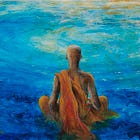Help me make it easier for others to find this publication on Substack by hitting the ❤️ or 🔁 at the top or bottom. Thank you!
Words: 640 | Normal Reading: 3 minutes | Slow Reading: 6 minutes
There are four types of spiritual seekers, according to the Bhagavad Gita. The fourth type of spiritual seeker realizes the truth and merges with divinity.
First Type: The Wealth-Seeker (Artharthi)
The first type of spiritual seeker desires pleasure. He craves wealth, the betterment of his family, status, recognition, and fame. The path he follows to attain satisfaction involves achieving and pursuing the material objects of the world. He spends his life continually performing karmas to create better life situations compared to others.
He prays to his God to grant him everything he desires for happiness. It is always a business transaction with God: " I will pray to you, God, and you give me this or that. " Ultimately, he suffers because nothing he achieves brings him happiness, as no objects, names, or forms of the world can provide enduring joy. Thus, he suffers.
Second Type: The Knowledge-Seeker (Jijnasu)
A thirst for understanding and knowledge drives this seeker. He seeks answers to life's big questions and looks for guidance in the scriptures and from different teachers. He changes teachers as easily as he changes his clothes. He is inquisitive and intellectually curious, seeking a deeper understanding of the universe and his place within it. But his desires are still seeking knowledge, experience, spiritual growth, or a “higher state.” He continuously seeks new spiritual practices that will suit his temperament. He wants to experience different “alter states” of consciousness. He doesn’t like the present moment and always understands the future will provide him with more “beautiful experiences.” He suffers, too.
Third Type: The Distressed (Arta)
The third type of seeker remembers the divine only when he is suffering. When the body is racked with pain, when life threatens to fall apart—be it through disease, disaster, violence, or fear—he suddenly folds his hands and looks up. Not out of devotion, not out of longing, but simply because he has run out of options. His prayer is not a devotion; it is a desperation.
He is tired of achieving this or that and practicing spirituality. After spending so much time seeking, he regrets the years he spent “seeking.” That regret is consuming him. He feels anxious and struggles like a fish out of water, gasping for breath. His ultimate desire is freedom from suffering. However, that desire adds another layer of suffering. He is desperate to awaken but cannot surrender his mind to his inner being. He is still suffering.
Fourth Type: The Being-Dweller (Jnani)
The fourth type of spiritual seeker realizes that the Inner Being—God is the highest state of consciousness. God is not a separate entity. One experiences God when one turns inward and becomes conscious by surrendering one's mind to Being. He abides and rests in Being permanently.
This seeker has stopped seeking. Having seen the futility of striving, he surrenders completely to the Being and comes home to the present moment. He no longer fights life. He no longer demands that it be different. Whether joy arises or pain unfolds, he remains at ease because he no longer identifies with the egoic story.
Destruction or delight, loss or gain, it moves through him like clouds shifting across the sky. He is the open space, the stillness beneath it all. He has surrendered not to future salvation but to the essence of Being itself. Life unfolds, and he embraces it. Whatever comes, he welcomes. Whatever goes, he lets go. For he is rooted in that which neither comes nor goes. He is the awareness in which everything unfolds.






